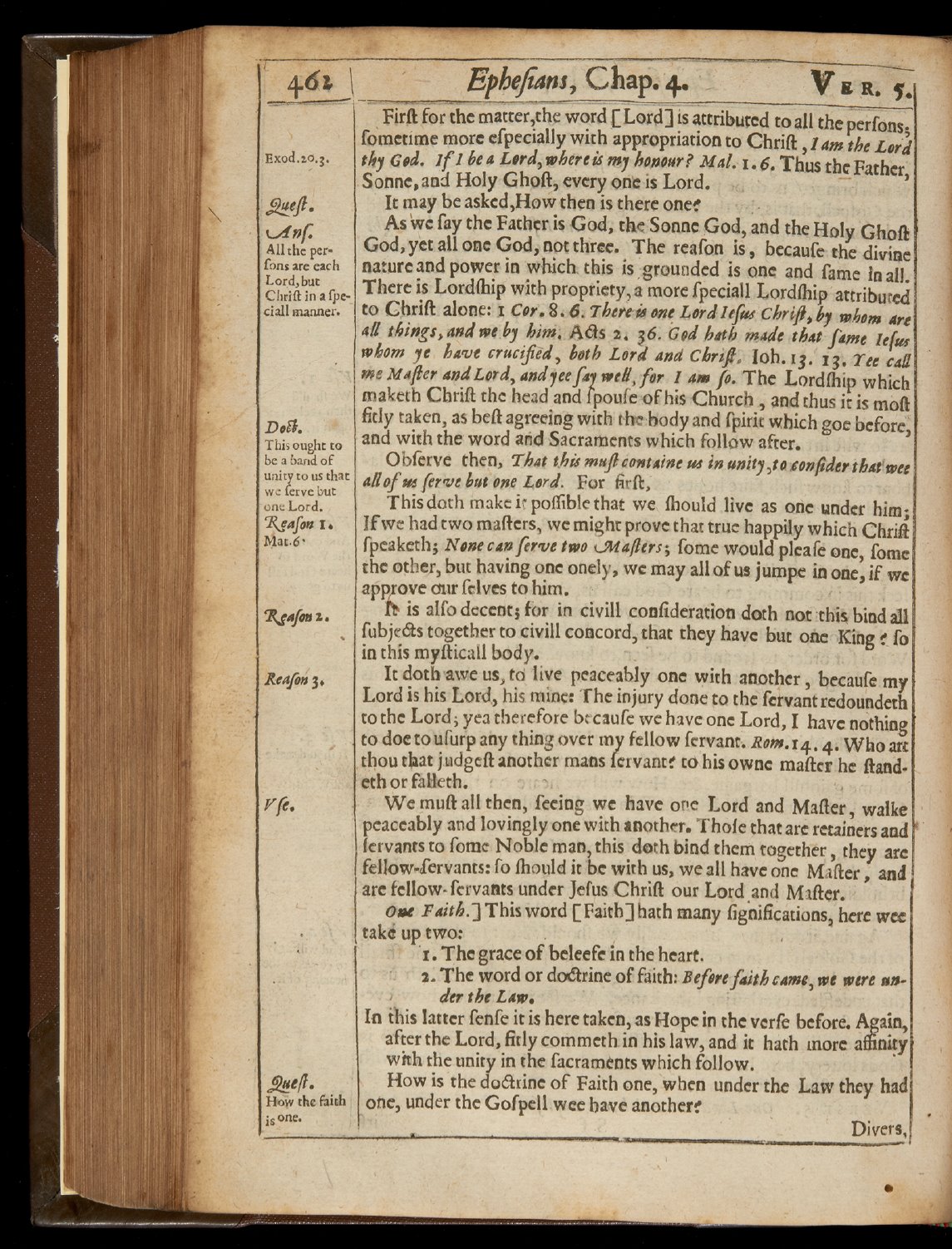

q.61,
\
Ephefiana,
Chap.
q..
'T
g
R.
s,
Pith
for the mattcr,the word
[
Lord]
is
attributed
to
all
the
perfons;
fometime more efpecially
with
appropriation to Chrift
,
/am
the
Lord
&xod.zo.3,
thy
God.
If
i
be
a
Lard,
where
is
my honour?
Mal.
t.
6.
Thus the
Father,
Sonne, and
Holy
Ghott,
every one
is
Lord.
Zefi,
It
may be
asked,How
then
is
there one!
nf
As we
fay
the Father
is
God,
the Sonne
God,
and
the Holy Ghoff
All
the
per-
God,
yet all one
God,
not three.
The
reafon
is ,
becaufe
the divine
Gm, are each
nature
and power
in
which. this
is
grounded
is
one
and fame
in
all.
Lord,
but
There
is
Lordfhi with propriety,
a
more
f
eciall
Lordfhi attributed
ChriRinafpe-
P
P
P
cialt
:Wanner.
to
Chrift
alone: t
Cor. 8. 6.
Therese
one
Lord
leftes
Cfirift,
by
whom are
all
things,
and
we by
him.
Ads
2.
36.
God
both
mode
that fame
le[
whom
rye
have
crucified,
both
Lord
anti
Chrefi'.
foh.13.
13.
Tee
call
me
Maier
and
Lord,
and
yee
fay
well,
for
1
am
fa.
The
Lordfhip
which
maketh
Chrift
the
head and fpoufe
of
his
Church
and thus it
is
molt
Delá,
fitly taken,
as
belt
agreeing with the
body
and fpirir
which
got
before,
This
oWght
to
and
with the word
and Sacraments which
follow after.
be a
b,,
iof
Obferve then,
That this mall
cant
aim
we
in
unity ,to
confider
that
wee
unity
rousthat
allof'a, fervebutoneLord.
For firft,
w<
Cecve
bvt
WC
Lord.
This
dath
make
i^
poilible
than
we fhouid live
as
one under him;
Alafon
r.
If
we had
two matters,
we
might
prove that true happily
which Chriti
Mat.6
fpeaketh; bane
can
ferve
two
sJ31a/ìer.c;
tome would
pleafe one, fome
the other, but
having one
onely,
we
may
all
of
us
jumpe
in
one,
if
we
approve our
f
eves
to him.
'a
fm
2
I
is
alto decent; for
ìn
civili confederation
doch
not
this
bind ail
fubjeóts
together
to
civili
concord, that they
have but one
King
!
fo
in
this myfticail
body.
Reafon
3,
It doth awe
us, to live peaceably one
with another
,
becaufe my
Lord
is
his
Lord,
his
mine:
The
injury
done to the fervantredoundeth
to the
Lord;
yea
therefore
becaufe we have one
Lord,
I
have
nothing
to
doe
toufurp
any
thing over
my fellow fcrvant. Rom.r4.
4. Who
art'.
thou that judgeft another
mans
fervant!
to
his
owne matter
he
Rand-
ethor falleth.
tfe.
We
mutt
all
then,
feeing we have one Lord
and
Matter,
waike'.
peaceably
and
lovingly
one with
another. Thole that
are retainers
and'
fervants to tome
Noble
man, this
dorh
bind
them
together,
they
are'
fellow-
,fervants: fo fhould
it
be
with
us,
we
all have one M ifler
,
and
are
fellow- fcrvants under
Jefus
Chrift
our Lord
and
M
tier.
ore Faith.]
This word
[Faith]
path many
fignifications, here
wee
take
up
two:
1.
The
grace
of
beleefe
in
the heart.
2.
The
word
or doltrine of
faith:
Before
faith
came,
we
were
un-
der the
Law.
In
this
latter
fenfe it
is
here taken,
as
Hope
in
the
verle before. Again,
after the
Lord,
fitly
commeth
in his
law,
and it hash more affinity
with the
unity
in
the facraments which follow.
e/f,
How
is
the doétrine
of
Faith one, when under the Law they
had
How the faith
one,
under
the Gofpell
wee have
another!
is
one.
Divers
,I

















